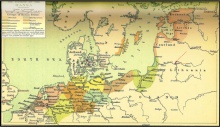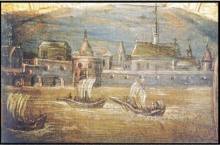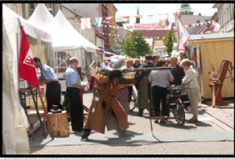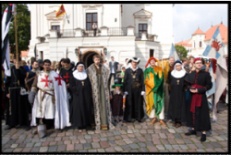The Patron of the Festival is the President of the Republic of Lithuania Dalia Grybauskaitė
HistoryIt is known for several years already that Kaunas has been entrusted to organise the festival of the New Hansa Union "Hansa Days" in 2011. It is great challenge both to the local government and to the townspeople. At that time, approximately 7 thousand spectators and participators of the event will gather together for a week, whom we will have to meet, accommodate, dine, coordinate and guarantee that they bring away best memories from the festival. As the town expects for great challenge in 2011, it is decided to organise the town's anniversary and the international Hansa festival simultaneously. What is more, the town initiated the establishment of the new public institution "Hansa Kaunas 2011", the constituters of which are the town's government and the public institution "Hansa Kaunas 2011" that has been organising the local Kaunas medieval festivals since 2005. The main task of the institution is to organise and supervise preparation for the international festival of the 2011s, i.e. modify the areas, take care of guests' accommodation, programme artistic part of the festival, find the sponsors, etc. The place of the festival will be Kaunas Old Town. All suitable areas will become arenas for concerts spectacles and circus acts. Other spaces of the Old Town will be prepared for exhibitions under the open sky or for pavilions for introducing the town. It is also necessary to find a suitable place to gather Hansa conferences and traditional meetings of the union's representatives. The purpose of the institution "Hansa Kaunas 2011" is to reason the townspeople into the fact that without their active participation and their own initiative it is impossible to organise an attractive event. HANSA LEAGUE
The historic Hanseatic League was a trading town union initiated by North-German merchants. The union comprised approximately 70 cities and 130 towns. It extended its working area in 20 European countries and existed from the 13th till the 16th century. The Hanseatic League controlled major part of international trade in North Europe. The Hansa merchants supplied Western and Central Europe with goods from Northern and Eastern Europe, i.e. luxury goods, food and law material such as fur, wax, grain, fish, flax, hemp, wood and wood building material such as pitch, tar and galipot. From Western and Southern Europe to Northern and Eastern Europe they brought drapery, metalwork (esp.: arms) and spice. The League was so powerful that it influenced a number of kingdoms economically, politically and culturally. HANSA KAUNAS COUNTING - HOUSE
THE NEW HANSA UNION
The new Hansa Union was established in 1980. It is the organisation of economically and politically active member-cities of the old Hanseatic League that aim for close cooperation. At the moment, the organisation unites more than 170 European towns. The main goal of the union is to revive the idea of autonomy of the European TOWN, the idea being based on historical heritage and encouraging comprehensive cooperation of the member-towns. It will have influence on development of social cultural consciousness and on the exchange cultural, economical and political experience of the TOWNS. The new Hansa strives for contributing to economical, cultural, social and municipal unity in Europe in this way strengthening reciprocal understanding of the towns and the local governments. Such a vision of the Hanseatic organisation formed the priorities of the union's actions:
• Cultural and traditional exchange; • Maintenance of economical and commercial contacts; • Youth involvement to the union's activities. INTERNATIONAL HANSA DAYS
HANSEATIC FESTIVAL IN KAUNAS
Since 1991, Kaunas is the sole Lithuanian town that belongs to the international towns' union "The New Hansa". Every year, Kaunas presents itself successfully at the annual event of the union "International Hansa Days" by introducing the heritage of cuisine, folk art, music, theatre, etc. Furthermore, since 2005, at the end of August, Kaunas draws crowds of people from the entire Lithuania, who can admire the unique Kaunas Old Town and lose themselves in the Middle Ages, i.e. try armour, play medieval games, taste the old European dishes, listen to the troubadours' songs, wield a sward, enjoy watching the night's sky coloured by amazing fireworks, and a lot more. The public institution "Hansa Kaunas" and Kaunas local government that organise the festival already for the fourth time have managed to achieve that the festival be known not only in Lithuania but also outside. Now the event has become the priority of the town and it now has gained its face, traditions and lots of devoted supporters. The festival has broadened: on the stage one can see not only Lithuanian performers but also guest artists from Germany, Poland, Russia, Latvia, Estonia, Belarus, Norway and Holland. Moreover, three documentary films have already been produced. Financing is increased as more and more supporters are found. Appropriations of both the local government and the Government of the Republic of Lithuania have been increased.
Go to “About us” |
Hansa League
Kaunas is allowed to organize the whole Hanseatic union cities international festival in 2011. We expect from five to seven thousand visitors on this festival!










 It is very important to all the member-TOWNS that they find themselves again as a part of the
Hanseatic Union. It is of even greater importance that they maintain the idea and spread it wide.
Therefore, Hansa decided to organise a festival - "The International Hansa Days" - to facilitate the task.
Annually, one of the member-TOWNS is appointed the centre of the international Hansa Days; at that time,
thousands of participators from the associate towns gather together there. Each town build up their
pavilion and introduce their cultural, economical and social values according their means. The majority of
the TOWNS not only take part in the international Hansa Days but also organise local Hansa festivals.
It is very important to all the member-TOWNS that they find themselves again as a part of the
Hanseatic Union. It is of even greater importance that they maintain the idea and spread it wide.
Therefore, Hansa decided to organise a festival - "The International Hansa Days" - to facilitate the task.
Annually, one of the member-TOWNS is appointed the centre of the international Hansa Days; at that time,
thousands of participators from the associate towns gather together there. Each town build up their
pavilion and introduce their cultural, economical and social values according their means. The majority of
the TOWNS not only take part in the international Hansa Days but also organise local Hansa festivals.